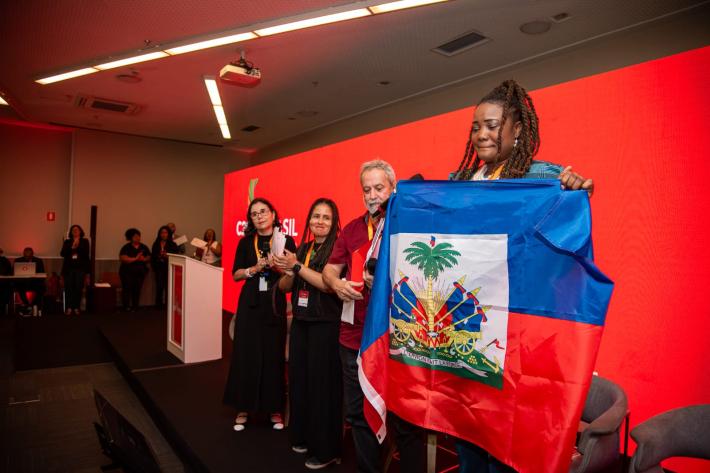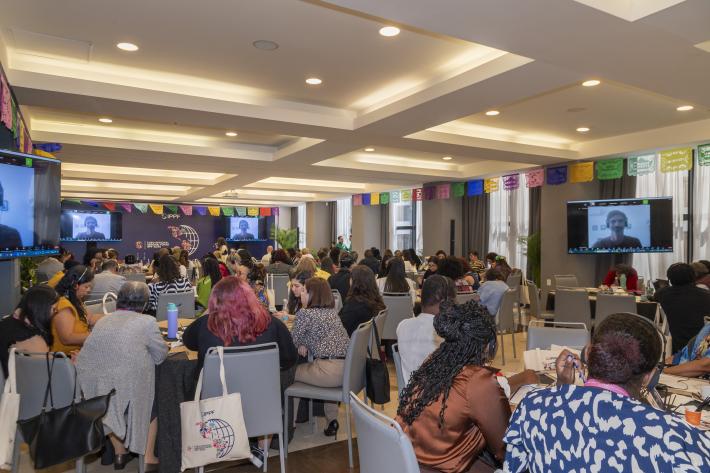Latest press releases
A selection of stories from across the Federation
Americas & the Caribbean
Breaking: IPPF Global Research Exposes Devastating Impact of the Trump Administration
Over Half of Partners and $85 Million Affected
For media enquiries


| 27 March 2025
We condemn Trinidad and Tobago’s Upholding Criminalization of Same-Sex Activity
The Trinidad and Tobago Court of Appeal’s decision to uphold the criminalization of consensual same-sex activity is an alarming assault on human rights. This ruling, which reinstates the criminality of private, consensual intimacy, is a direct violation of the fundamental rights of LGBTQI+ people and a stark reminder of the colonial-era laws that continue to inflict harm across the Caribbean. IPPF Americas and the Caribbean Regional Office (ACRO) together with local member Family Planning Association of Trinidad and Tobago (FPATT) stand unequivocally with LGBTQI+ communities in Trinidad and Tobago and across the region. We reject this ruling and any legislation that denies people their right to love freely and live with dignity. This decision reflects a justice system with oppressive statutes that have no place in a just and democratic society. According to Eugenia López Uribe, Regional Director of IPPF ACRO, this ruling is not just a setback for LGBTQI+ rights, it is an attack on human dignity: “It is a deliberate attempt to silence, criminalize, and exclude a part of citizens and people living in the country. But let this be clear: IPPF regional office in the Americas and the Caribbean will continue fighting for and with the LGBTQI+ movement so they won’t be silenced. IPPF will not back down. LGBTQI+ people’s rights are non-negotiable. " Criminalizing LGBTQI+ lives perpetuate violence, discrimination, and stigma. It emboldens hate, undermines access to justice, and creates a climate of fear where LGBTQI+ individuals are forced to live in further vulnerability. Research published by CAISO: Sex and Gender Justice’s Wholeness and Justice programme in 2023 indicate that 1 in 3 LGBTQI+ individuals in Trinidad and Tobago experience discrimination and harassment, 1 in 4 face family violence, and 1 in 4 experience physical assault. “FPATT [Family Planning Association of Trinidad and Tobago] notes the recent Court of Appeal decision that affirms an old law before independence that criminalizes persons of a different orientation, due to a technicality- the saving law clause,” says Professor Rose Marie Antoine, FPATT’s Board of Trustees President. “Interestingly, the British colonial masters that drafted that law have long abolished it. We note too that this was not a unanimous court decision. FPATT looks forward to the day when our legal system and laws can reflect true equity and non-discrimination, serving all our nation’s peoples in their access to fundamental rights and protecting vulnerable groups from harm and violence. FPATT will continue to welcome and serve all people regardless of their sexual orientation.” We call for urgent action: The immediate repeal of Sections 13 and 16 of the Sexual Offences Act. A commitment from Caribbean governments to decriminalize same-sex relations and protect LGBTQI+ individuals from discrimination and violence. An end to the use of colonial-era "savings law" clauses to justify human rights violations. Now is the time for every human rights defender, policymaker, and ally to take a stand. LGBTQI+ people in Trinidad and Tobago—and across the Caribbean, our region and the world—deserve justice, equality, and the freedom to live without fear. IPPF will not stop until that is a reality. For more information, please contact [email protected] - +44 7918 845944 About the International Planned Parenthood Federation IPPF is a global healthcare provider and a leading advocate of sexual and reproductive health and rights (SRHR) for all. Led by a courageous and determined group of women, IPPF was founded in 1952 at the Third International Planned Parenthood Conference. Today, we are a movement of 158 Member Associations and Collaborative Partners with a presence in over 153 countries. Our work is wide-ranging, including comprehensive sex education, provision of contraceptive, safe abortion, and maternal care and responding to humanitarian crises. We pride ourselves on being local through our members and global through our network. At the heart of our mission is the provision of – and advocacy in support of – integrated healthcare to anyone who needs it regardless of race, gender, sex, income, and crucially no matter how remote.
| 31 July 2024
Venezuela: Only in democracy are rights guaranteed.
Haz click aquí para leer este boletín en español. IPPF expresses our concern about the situation in Venezuela and our total solidarity with its people, who on 28 July received the news from the National Electoral Council (CNE) that the current president, Nicolás Maduro, was elected for a third presidential term. There are serious allegations of a lack of transparency in the process and we join the international community in demanding the publication of the election results, because, as of today, July 31st, the CNE has not shown the results of the election to prove the victory of Nicolás Maduro. It is worrying that the state security forces have responded with violence and repression since the beginning of the mobilisations, which continue, with hundreds of people arrested and a growing number of deaths. In addition to the current emergency, inequality, gender inequality and lack of access to health services, including sexual and reproductive health, have been on the rise for the past 25 years. It is impossible to forget: in Venezuela, the number of femicides has doubled in the last 6 years; 28.7% of people of sexual and gender diversity have been victims of violence by state security forces; 91.5% of complaints of violence against women are shelved or dismissed; legislation on abortion is extremely restrictive and services are very limited; in addition, 7.7 million people have been forced to move because of the socio-political context. With extreme concern, IPPF in the Americas and the Caribbean condemns the Venezuelan government's repression and violence against citizen mobilisations. It is unacceptable that while exercising their right to protest and free expression, Venezuelans are victims of criminalization and physical and political violence. IPPF ACRO joins the Venezuelan society in their demands for respect of democracy because the will of the people through authentic elections is a right and must be guaranteed by the State. ‘The situation in Venezuela further exacerbates the escalation of authoritarianism and violence in our region,’ said Alessandra Nilo, Director of External Relations at IPPF ACRO. ‘Democracy is conducive to states that guarantee and advance rights, including sexual and reproductive rights which, we know, in times of high tension and crisis, are the first to be violated. At this difficult time, we demand that the Venezuelan State returns to the democratic path, strengthens its institutions and respects the rights and wishes of its people. It is essential to protect the dignity and hope of all people, especially girls and women in all their diversity.’ ‘IPPF ACRO and Member and Partner Associations in the region are attentive to the development of events, we remain committed to Venezuelan people and their integral wellbeing, and we will continue to provide sexual and reproductive health care and services in Venezuela and, given the projected intensification of the migration wave, also in surrounding countries such as Colombia, Peru and Ecuador.’ Header image credit: REUTERS/Leonardo Fernandez Viloria

| 09 May 2024
IPPF celebrates historic milestone for HIV prevention in the Caribbean
Haz click aquí para leer este posicionamiento en español. Port of Spain, May 8.- The Jamaica Family Planning Association (JFPA), St. Vincent Planned Parenthood Association (SVGPPA) and the International Planned Parenthood Federation Regional Office in the Americas and the Caribbean celebrate Belize, Jamaica and St. Vincent and the Grenadines for receiving the World Health Organization’s certification for eliminating perinatal transmission* of HIV and Syphilis, a historic milestone for women and infants in the Caribbean. This significant achievement advances efforts to effectively prevent HIV transmission in our region. We commend the commitment of governments, health professionals, civil society organizations and communities, including the Jamaica Family Planning Association (JFPA) and St. Vincent Planned Parenthood Association (SVGPPA), both IPPF Member Associations, to invest in adequate attention for HIV prevention and sexual and reproductive health and rights. For Eugenia Lopez Uribe – IPPF Americas and Caribbean Regional Director, “This juncture presents an excellent opportunity to enhance HIV prevention strategies and to show how a well-done prenatal care, where women have access to all necessary tests and treatments, including HIV tests and medicines, works. It's a collective victory: for science, which has advanced and shows its efficiency, and for decision makers who adopt evidence-based responses to HIV." JFPA and SVGPPA have been key in responding to HIV in their countries, as they have been working to integrate HIV and STI services into its overall family planning offering. JFPA provides counselling, testing and referral of pregnant women at their first ante-natal visit, while SVGPPA offers HIV/STI screening and counselling, both working together with strong HIV organizations on the ground.

| 16 October 2023
IPPF ACRO express concern over guidance of the Zambian Ministry of Health who advised against the use of the term “sexual and reproductive health and rights”.
At a time of profound and multiple crises, it is worrying that the focus of any government's action is to go back on already consolidated international commitments, particularly those which recognize, based on evidence, that Sexual and reproductive health and rights (SRHR) are fundamental human rights, central to eradicating poverty and achieving sustainable development across its social, economic, and environmental dimensions. SRHR – which encompasses a range of issues, including universal access to SRH services and supplies, comprehensive sexuality education, and ending gender-based violence and harmful practices such as early, child and forced marriage – are fundamental to the ability of all people, especially women, adolescent girls and young people, to lead full, satisfying, healthy and productive lives. SRH services are a critical aspect of SRHR, but a complete understanding of sexual and reproductive health and rights goes far beyond on access to health facilities and services to include an array of social, legal, institutional, and financial arrangements that enable individuals to exercise their rights in general and addresses the underlying social determinants. In this regard, our Latin American community urges the government of Zambia to review its position and, on the contrary, to improve and expand the SRHR services, including increasing funding in this sector, for example by investing in fulfilling the human rights of women and girls, in all their diversity, as gender discrimination is one of the leading determinants of poor health and unwanted SRHR outcomes. It is also key to addressing inequities in access due to poverty and multiple forms of discrimination, stigma and social and economic exclusion affecting various population groups. We conclude by highlighting the importance of evidence-based policies and, in 2023, the data indicates that effective policies are not those based on stigma and discrimination or elimination of rights. On the contrary, effective policies are those that include, care for, and treat all people as subjects of rights, capable of making decisions about their health and reproductive life, with the support of a State committed to promoting citizenship and the human dignity of their people. Here, at IPPF ACRO, we will remain attentive and always willing to contribute so that rights do not go backwards and no one is left behind. In solidarity, Eugenia Lopez Uribe Regional Director for the Americas and the Caribbean
















